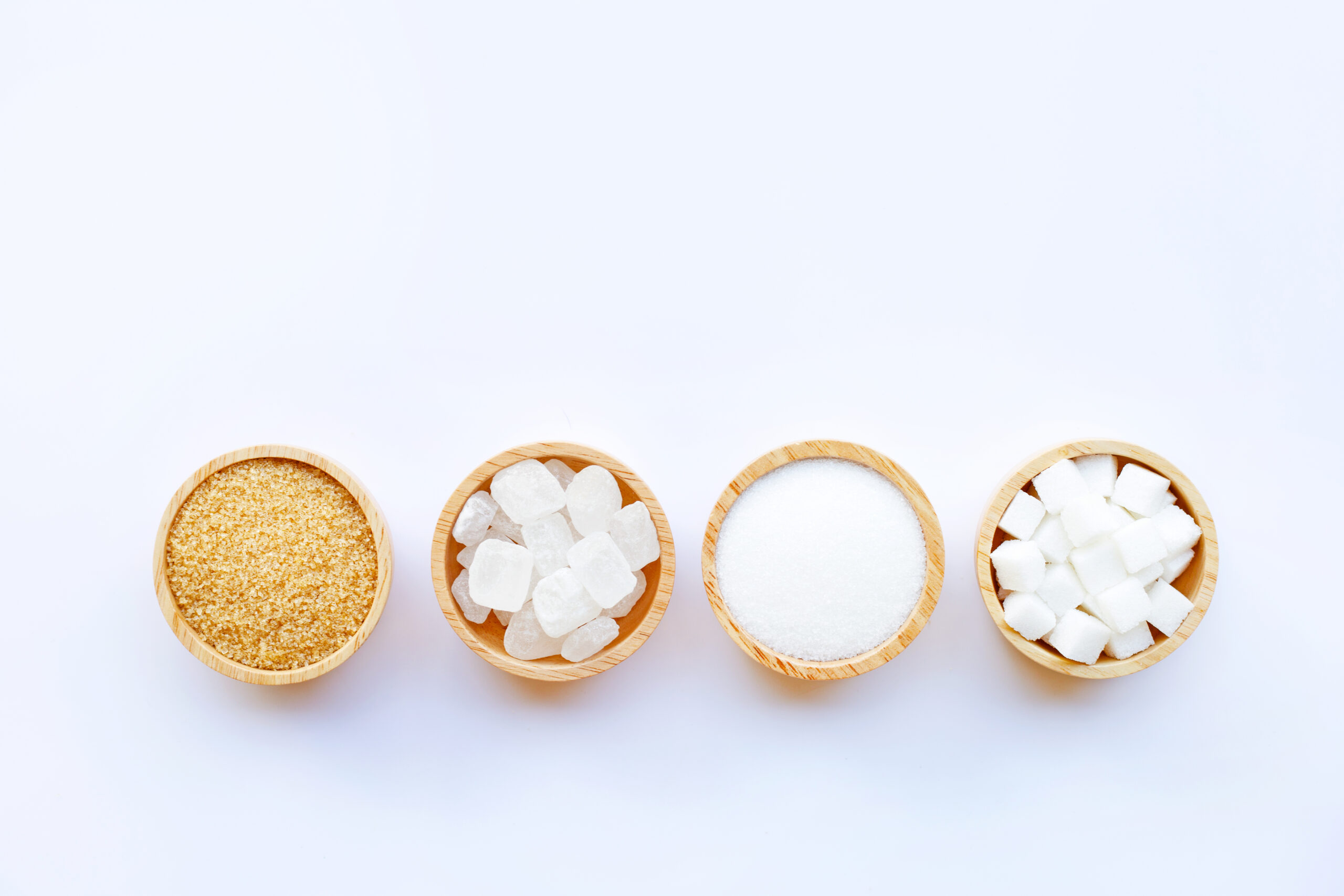Our Complex Relationship With Sugar and Sweets

If you’ve found yourself wondering whether you eat too many sweets or how sugar might be affecting your body and brain, you’re not alone. Many of us have a complex relationship with sugar that extends far beyond worries about our waistline. If you have a feeling that you eat more sugar than you should, but you struggle with calming a persuasive sweet tooth and want to know why and how to do so, this article is for you.
What is Sugar?
Sugar can be a confusing food because it comes in many forms. We often call all sweet treats “sugar”, but sugar isn’t just found at the dessert stand. In fact, sugar is in many everyday foods, including favorite beverages, items from the bakery, and convenience snacks, even some that may appear healthy.
There’s a difference between natural sugars found in produce or grains and refined sugars that are added to packaged foods or baked goods. More specifically, the latter includes forms like cane sugar, brown sugar, and sugar packets, and it’s our overconsumption of these that have the most negative impacts on health.
Our complex relationship with sugar refers to the sugar we intentionally add to other foods to make them sweeter or that a manufacturer adds to improve taste..
Your Brain on Sugar
Have you ever found yourself daydreaming about your next sugary treat? There’s a good reason for that. While sugar in the form of glucose (preferably from the digestion of healthier complex carbs versus desserts) is the main source of energy for your brain, too much can be a bad thing.[1][2]
Overconsumption of sugar can essentially create a sugar addiction, as has been suggested by animal and humans studies on sugar and brain response.[3][4] That’s why it’s so hard to stop eating after just one truffle when you have a whole tray of assorted chocolates in front of you. It’s also why you might notice a sweet craving at the end of the day or even between meals.
Rat studies have shown that added sugar consumption may trigger a negative feedback pathway in the brain, which can turn off the stress response and reinforce the habit of eating too much sugar, over and over again.[5]
A small 2015 study on women ages 18-40 years old looked at the different effects of sucrose (table sugar) and aspartame (zero-calorie sweetener) on the brain. The authors found that sucrose consumption results in significantly higher activity in the hippocampus (the memory center of your brain) and lower stress-induced cortisol.
This suggests that we have a metabolic-brain-negative feedback pathway that sugar can impact, making people under stress more likely to become addicted to sugary foods and possibly at higher risk for obesity and related disease.[6]
In addition to creating addictive habits within your brain, studies have found that eating too much added sugar may increase your risk for depression, learning disorders, and worsened memory.[7][8] While eating sugar provides short-term pleasure, it can have negative long-term mental health effects.
Research shows that diets chronically high in added sugar lower the brain’s production of a chemical called brain-derived neurotrophic factor (BDNF). Low levels of BDNF have been linked to impaired memory, worsened sugar metabolism, insulin resistance, and even neurodegenerative diseases like Alzheimer’s.[9]
How Excessive Sugar Harms Your Health
Recent surveys have shown that although many Americans are eating less added sugar than we once did, most are still eating more than 300% of the recommended daily added sugar intake.[10] Many European countries are also consuming far more added sugar, primarily from confectionary products, than is recommended for optimal health outcomes.[11]
The most talked-about reason why eating too much-added sugar is problematic is because of its link to unwanted weight gain. Sugar is calorically-dense, which means that even small portions contribute a large number of calories to your diet. One tablespoon (16 grams) contributes nearly 50 calories.[12]
And you’ve probably noticed that sugary foods don’t keep you feeling full or satisfied for very long, often leaving you reaching for more. This is because sugar is full of “empty calories” that don’t offer nutritional benefits.
High-sugar foods are typically lacking in nutrients that are healthy and satiating, like fiber and complex carbohydrates. As such, you may feel your blood sugar rise and fall quickly after eating sugary treats. Studies have also found that people who regularly drink sugary beverages consistently weigh more than people who don’t.[13]
Furthermore, eating too many sweets made with added sugar can increase your risk for chronic diseases.[14] Many of these can go hand-in-hand with being overweight or obese. For example, diets high in added sugar have been linked to a higher incidence of type 2 diabetes, cardiovascular disease, and even certain cancers. [15][16][17] One factor is because sugar takes up space that could be filled by more nutrient-dense, healthy foods.
How to Reduce Sugar In Your Diet
Now that you understand all the ways that eating too many sweets may be wreaking havoc on your brain and body, let’s talk about how to reduce your consumption.
A good place to start is to write down everything you eat for a few days, so you have an understanding of what you are eating. Then, identify which foods tend to be high in added sugar and determine what you can start reducing or removing altogether.
Some ways to low your sugar intake include:
- Replacing soda, juices, sports or energy drinks, and sweetened teas with plain water or unsweetened seltzer water. Keep a water bottle filled and with you throughout the day.
- Replace sugary coffee and tea sweeteners with Stevia, or try adding unsweetened non-dairy milk instead.
- Substitute olive oil and vinegar for salad dressings that have added sugar.
- Top oatmeal, yogurt, and breakfast cereals with naturally-sweet berries or fresh fruit instead of jam or brown sugar.
- Replace bowls of sweets or packaged sugary snack foods in the house with a bowl of fresh fruit or pre-cut veggie sticks in the fridge.
- Make a habit to stick to the perimeter of the grocery store, especially where the fresh produce and least processed items are, steering clear of the snack and cookie aisles that can be tempting.
- Order your groceries for pick-up so you don’t even have to walk near those aisles.
- Consider practicing intermittent fasting. Many people report that practicing intermittent fasting, or not eating for set periods of time during the day or a few times per week, has actually reduced sugar cravings. It may also help improve the quality of your diet overall.
If you’re evaluating the role of desserts and sweets in your life, know that there are complex reasons the challenge around sugar exists and things you can do about it, starting today.
Read More:
[1] Sugar for the brain: the role of glucose in physiological and pathological brain function
https://www.ncbi.nlm.nih.gov/pmc/articles/PMC3900881/
[2] Sugar and the Brain
https://neuro.hms.harvard.edu/harvard-mahoney-neuroscience-institute/brain-newsletter/and-brain/sugar-and-brain
[3] Sugar addiction: is it real?
https://pubmed.ncbi.nlm.nih.gov/28835408/
Author:

Lauren Panoff, MPH, RD
Lauren specializes in plant-based living and vegan and vegetarian diets for all ages. She also enjoys writing about parenting and a wide variety of health, environmental, and nutrition topics. Find her at www.laurenpanoff.com.





